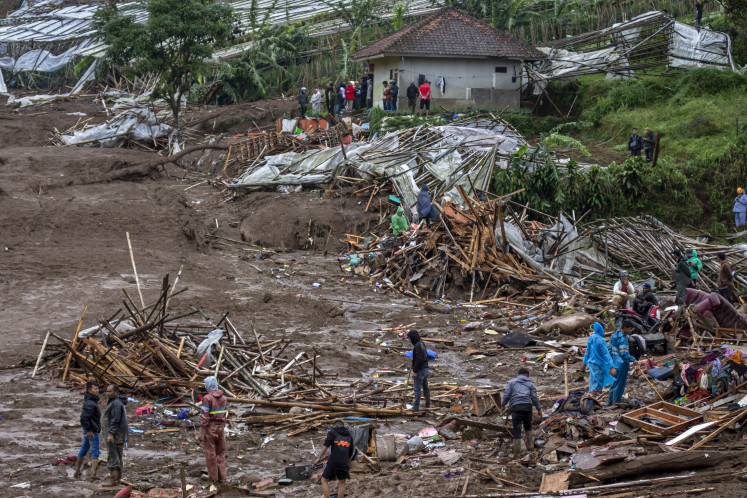Popular Reads
Top Results
Can't find what you're looking for?
View all search resultsPopular Reads
Top Results
Can't find what you're looking for?
View all search resultsAsia-Pacific NGOs sue ADB through people's `tribunal'
Asia-Pacific NGOs are holding a two-day mock tribunal, with expert witnesses on debt, water, agriculture, gender, indigenous people and the environment to reveal the Asian Development Bank's "sins" through its loan program
Change text size
Gift Premium Articles
to Anyone
Asia-Pacific NGOs are holding a two-day mock tribunal, with expert witnesses on debt, water, agriculture, gender, indigenous people and the environment to reveal the Asian Development Bank's "sins" through its loan program.
Organizers said the main idea of the tribunal - organized outside the venue of the ADB's annual meeting - is to prove through testimony and documentary evidence that the ADB's projects and values are directly affecting people's lives and violating their rights.
The mock tribunal began Saturday, with Indonesian urban poor activist Wardah Hafidz as the judge.
The trial heard expert witnesses from countries including Indonesia, the Philippines, Bangladesh and Nepal.
They stood under oath to share their testimony about ADB projects in their respective countries.
Sonny Africa, head researcher at IBON Foundation in the Philippines, said in his testimony that the ADB, initially set up in 1966 to help lift underdeveloped countries out of poverty, had shown a significant contradiction in terms of reality.
"The ADB has been proved to be a bank for profit and development. The ADB does not implement their vision of helping underdeveloped countries, it is promoting private profit, domestic capitalists and big foreign capitalists," he said.
He added that IBON has been monitoring ADB activities for the last 30 years.
Africa said since its establishment, the Bank has burdened the underdeveloped countries of the Asia Pacific with debt; used debt to impose "free market" policies of investment liberalization, privatization and deregulation.
He said ADB also used debt to support dictators and undemocratic governments.
"As a result, around 550 million people from debt-ridden Asia-Pacific countries are undernourished, while another 1.7 billion people must live on less than US$2 a day," Africa said.
In the Philippines' experience, Africa said the ADB-funded $300 Power Sector Restructuring Program in 1998 and the $450 million Power Sector Development Program in 2006 had dismantled state entities, removed subsidies and moved to market prices.
The Health Sector Develop-ment Program in 2004 (worth $200 million) and the Support for Health Sector Reform in 2005 (worth $1 million) had forced market prioritization and introduction of user charges in the Philippines, he said.
ADB loans also contributed to human rights violations, Africa added, "with a $3 billion loan to the Arroyo regime from 2001 to the present *being* responsible for almost 1,000 killings, almost 400 assassinations and almost 200 disappearances."
Another expert witness, Ahmed S. Mahmud from VOICE spoke among others on the impacts of the Khulna Jessore Drainage Rehabilitation Program in Bangladesh.
During the drainage project implementation, Mahmud said, "heavy silting and drainage congestion occurred in the river channels ... silted up rivers are drying up, indigenous wildlife, fish and crop biodiversity have been threatened, thousands of hectares of land have been permanently flooded.
"Instead of agricultural productivity, the project created water clogging. To date, an estimated 300,000 people in the Khulna Jessore region live in a water-clogged, traumatized situation.
"Children cannot go to school, farmers cannot grow food, and cattle are not able to graze freely," Mahmud said.
Acting judge Wardah said people from ADB member countries should have free access to get more information on the ADB and its loan programs, as well as give their opinions on the bank's existence.
"But we are not allowed to freely enter the meeting site."
If the ADB was found guilty at the mock trial, she said, "We would have further recommendations for the ADB to review their policy and to give the Indonesian government another push to end its bad habit of debt."










